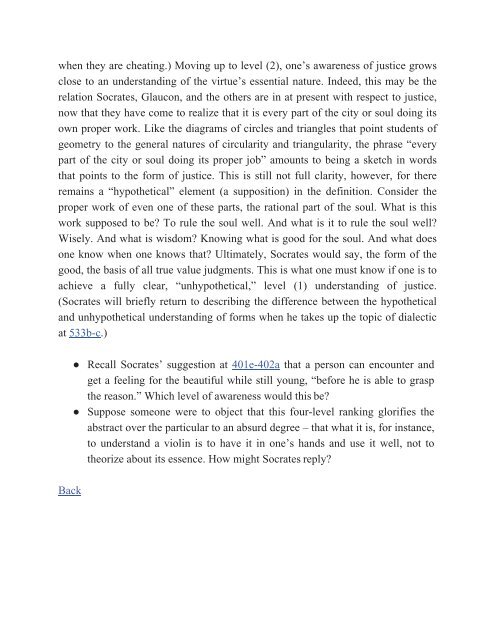The Intelligent Troglodyte’s Guide to Plato’s Republic, 2016a
The Intelligent Troglodyte’s Guide to Plato’s Republic, 2016a
The Intelligent Troglodyte’s Guide to Plato’s Republic, 2016a
Create successful ePaper yourself
Turn your PDF publications into a flip-book with our unique Google optimized e-Paper software.
when they are cheating.) Moving up <strong>to</strong> level (2), one’s awareness of justice grows<br />
close <strong>to</strong> an understanding of the virtue’s essential nature. Indeed, this may be the<br />
relation Socrates, Glaucon, and the others are in at present with respect <strong>to</strong> justice,<br />
now that they have come <strong>to</strong> realize that it is every part of the city or soul doing its<br />
own proper work. Like the diagrams of circles and triangles that point students of<br />
geometry <strong>to</strong> the general natures of circularity and triangularity, the phrase “every<br />
part of the city or soul doing its proper job” amounts <strong>to</strong> being a sketch in words<br />
that points <strong>to</strong> the form of justice. This is still not full clarity, however, for there<br />
remains a “hypothetical” element (a supposition) in the definition. Consider the<br />
proper work of even one of these parts, the rational part of the soul. What is this<br />
work supposed <strong>to</strong> be? To rule the soul well. And what is it <strong>to</strong> rule the soul well?<br />
Wisely. And what is wisdom? Knowing what is good for the soul. And what does<br />
one know when one knows that? Ultimately, Socrates would say, the form of the<br />
good, the basis of all true value judgments. This is what one must know if one is <strong>to</strong><br />
achieve a fully clear, “unhypothetical,” level (1) understanding of justice.<br />
(Socrates will briefly return <strong>to</strong> describing the difference between the hypothetical<br />
and unhypothetical understanding of forms when he takes up the <strong>to</strong>pic of dialectic<br />
at 533b-c.)<br />
Recall Socrates’ suggestion at 401e-402a that a person can encounter and<br />
get a feeling for the beautiful while still young, “before he is able <strong>to</strong> grasp<br />
the reason.” Which level of awareness would this be?<br />
Suppose someone were <strong>to</strong> object that this four-level ranking glorifies the<br />
abstract over the particular <strong>to</strong> an absurd degree – that what it is, for instance,<br />
<strong>to</strong> understand a violin is <strong>to</strong> have it in one’s hands and use it well, not <strong>to</strong><br />
theorize about its essence. How might Socrates reply?<br />
Back


















